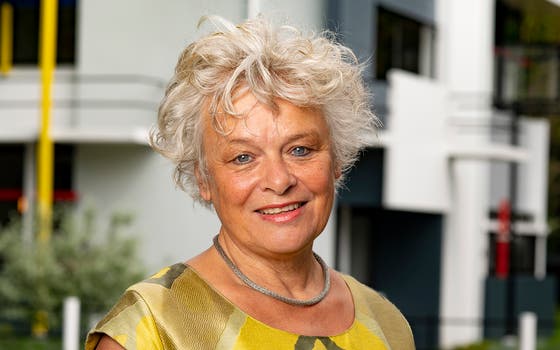Elise van de Putte: The art of lifecycle medicine

'What do you get up in the morning for'? 'What makes life worth living for you?' Questions Elise van de Putte asked her patients in the consulting room in order to connect with the child's core goals and values.
Elise van de Putte is paediatrician of social paediatrics and professor of life course medicine and co-founder of the national centre of expertise on child abuse (LECK). She received the WKZ medal for her outstanding work in healthcare, education and research from Arno Hoes, dean and vice-chairman of the UMC Utrecht Board of Governors. Elise delivered her farewell speech on Thursday 28 March in the Academy Building in Utrecht. Her work has enriched the medical world and influenced the way we look at paediatrics: It is about understanding the whole person in his or her environment. Elise: "Treating the disease is no longer the central issue but treating the child with his or her own goals."
Elise van de Putte studied biology and medicine at Leiden University. She became a paediatrician and, via Amsterdam UMC, joined the Wilhelmina Children's Hospital in Utrecht as medical head of ambulatory care. Together with the team, she coordinated the move from the WKZ to its current location at the Utrecht Science Park, then called De Uithof, in 1999. In 2006, Elise obtained her PhD on her research into chronic fatigue syndrome in children. She then had the opportunity to set up the Department of Social Paediatrics as a paediatrician and researcher. The focus of treatment and research of that department Elise put on persistent physical complaints, child abuse and, more recently, eating disorders in the young child.
"Paediatricians are trained to learn about diseases, but not conditions where you need environmental and psychological factors to understand the symptoms properly," Elise says. "Take children with chronic fatigue syndrome, for example. Our scientific research showed that these children sometimes have difficulty mentalising: understanding yourself with all your thoughts and feelings, and understanding others, including the behaviour of others. Paediatricians Social Paediatrics recognise this and work with children and their parents on it. Language is very important in this."
Some patients are more skilled at mentalising than others and this is partly due to their own backpack. "Because a person's past colours the meaning they give to their own behaviour and the behaviour of another," says Elise. "If you go through an intense event, a trauma, it affects your ability to understand behaviour. This insight helps me understand the language of parents and children. By realising this, I can better accept that sometimes it is so incredibly difficult to achieve trust and connection in the consulting room."
In her farewell speech, Elise calls for more attention to language. She argues that you can provide safety with language. "You can also use it to recognise and prevent traumatisation, promote mentalisation and develop more personal control or direction. And when people - including children - experience that direction, they feel healthier and happier, research shows."
Elise did a lot of scientific research in close collaboration with researchers from other faculties. In her team, for instance, she and psychologists developed an online behavioural therapy for adolescents with chronic fatigue syndrome. More than half of the children improve with that treatment. Further analysis of the language used in this treatment reveals patterns that indicate whether or not they have personal control. The patients who get better show more direction, personal control, than those who do not recover, and this is already visible at the beginning of treatment. This helps us to select the children who do not recover from this treatment at the beginning and offer a different treatment. We conducted this research together with linguists and computer scientists.
In the near future, Elise will continue to supervise PhD students. She has confidently handed over the other tasks to the next generation of paediatricians in social paediatrics, including Sanne Nijhof, Ingrid Russel, Jopje Ruskamp, Berbe Paes. Elise: "It is wonderful to see more and more young doctors looking at the whole child and connecting with the child's values and norms. I am incredibly fortunate to have been able to shape social paediatrics at Wilhelmina Children's Hospital."
